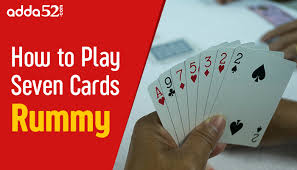Rummy 7 Card Rules, is a beloved card game enjoyed worldwide, known for its blend of strategy, skill, and chance. While there are numerous variations of Rummy, playing with 7 cards offers a unique and engaging twist. This version is typically faster-paced and perfect for those looking for a quick, strategic game. Here, we outline the rules and strategies for playing 7-card Rummy.
Objective
The primary goal in 7-card Rummy is to form sets and runs with your cards. A set consists of three or four cards of the same rank but different suits (e.g., 7♦, 7♠, 7♣), while a run consists of three or more consecutive cards of the same suit (e.g., 4♥, 5♥, 6♥).
Setup
- Deck: A standard 52-card deck is used.
- Number of Players: This version is best played with 2 to 6 players.
- Dealing: Each player is dealt 7 cards. The remaining cards form the draw pile, with the top card placed face-up to start the discard pile.
Basic Gameplay
- Drawing Cards:
- At the beginning of your turn, draw one card from either the draw pile or the discard pile.
- Forming Melds:
- Organize your hand by forming sets and runs. You are not required to lay down melds until you can go out.
- Discarding Cards:
- After drawing and organizing your hand, discard one card to the discard pile to end your turn.
- Going Out:
- The round ends when a player can form all their cards into valid melds and discards their final card.
Scoring
- Melds:
- Melds are not scored individually during the game but are crucial for going out.
- Deadwood:
- Any cards not part of a meld are considered deadwood and carry point values:
- Face cards (K, Q, J): 10 points each
- Aces: 1 point
- Number cards: Face value
- The player who goes out scores the difference between their deadwood points and their opponents’ deadwood points.
- Any cards not part of a meld are considered deadwood and carry point values:
- Winning the Game:
- The game can be played over several rounds, with the first player to reach a predetermined score (e.g., 100 or 500 points) declared the winner.
Strategy Tips
- Early Game Strategy:
- Focus on forming sets and runs quickly to reduce the risk of holding high-value deadwood.
- Be cautious about picking up cards from the discard pile, as this gives opponents clues about your hand.
- Mid-Game Adjustments:
- Assess your hand regularly to decide whether to aim for sets or runs based on the cards you draw.
- Pay attention to the cards your opponents discard to anticipate their strategies and avoid helping them.
- Endgame Considerations:
- As the game progresses, try to reduce the number of high-value cards in your hand to minimize potential deadwood.
- Be ready to go out as soon as possible, especially if you notice opponents are close to forming their melds.
- Managing Deadwood:
- Continuously work on minimizing deadwood points by discarding high-value cards that do not fit into your melds.
- Use low-value cards strategically to keep your hand flexible and adaptable.
Variations
While the rules above outline the standard way to play 7-card Rummy, there are many variations that can add extra challenges and excitement. Some popular variants include:
- Jokers:
- Introduce one or two Jokers into the deck as wild cards that can substitute any card in a set or run.
- Bonus Points:
- Award bonus points for specific melds, such as a run of seven cards or four of a kind.
- Special Rules:
- Implement special rules like allowing players to lay down partial melds during their turn or requiring a specific number of sets and runs to go out.
Conclusion
7-card Rummy is a fast-paced, strategic variant of the classic card game that is perfect for both casual and serious players. By understanding the rules and employing smart strategies, you can enjoy an engaging and competitive experience. Whether you’re playing with friends or in a more formal setting, 7-card Rummy offers a dynamic and enjoyable twist on a timeless favorite. Gather your cards, invite some friends, and dive into the exciting world of 7-card Rummy.




